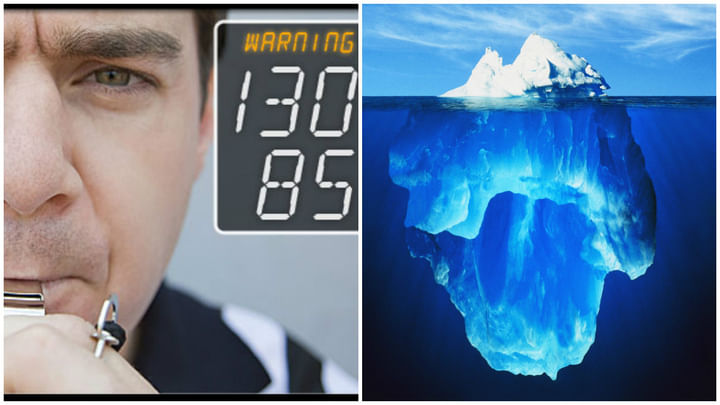Screening for Prehypertension
Guidelines for vary from time to time, but generally accepted classification of hypertension ( JNC7)is
Average of two or more properly measured readings at each of two or more visits after an initial screen:
Normal < 120 mm Hg SBP AND DBP < 90 mm Hg
Prehypertension 120 -139 mm Hg SBP OR DBP 80 to 89 mm Hg
Stage 1 HTN 140 -159 mm Hg SBP OR DBP 90 to 99 mm Hg
Stage 2 HTN >/= 160 mm of Hg SBP OR DBP >/= 100 mm Hg.
Prevalence of prehypertension among adults in United States is approximately 37 percent.
Study done by Yadhav S et al showed prevalence of prehypetension was 32.3 percent in India with highest 36% among 30-39 yrs age group, indicates that awareness is necessary for regular blood pressure check up.
People diagnosed with hypertension represents “tip of an iceberg”.
Many patients get to know about their raised blood pressures at the time of diagnosis, heart attack, stroke or kidney disease( end organ failures) which would have been preventable if treated at an early stage.
Why hypertension should be diagnosed and treated ?
Hypertension currently causes 2/3rd s of all strokes and half of all cases of ischemic heart disease.
Reduction in high blood pressure leads to large reduction in stroke, heart failure, renal failure, aortic dissection, coronary events and death.
Prehypertension: It is an entity where SBP >120 -139 mm Hg or DBP 80-89 mm Hg.
Multiple epidemiological studies demonstrated increased cardiovascular risk in patients with prehypertension.People with prehypertension have increased risk of progression to sustained hypertension, the prevalence of hypertension increases from approximately 10 percent at age of 30 yrs to as high as 90 percent after age of 65 yrs.
Framinham hypertension risk prediction score, may help identification of prehypertensive patients who are at gretest risk for pregression to hypertension. Risk calculator includes variables like age, sex, family history of hypertension, body mass index and smoking. Most important predictors of these were higher baseline blood pressure and older age.
Screening for hypertension: optimal interval for screening is not known.
2007 USPSTF( United States Preventive Services Task Force) guidelines recommend
Screening every two years for persons with SBP <120 mm Hg and DBP < 80 mm Hg
Yearly for persons with SBP 120-139 mm Hg or a DBP 80 -89 mm Hg
How to manage Prehypertension:
TROPHY stydy( TRial Of preventing Hypertension) results showed that there is no role for pharmacotherapy in prehypertension except in special conditions like diabetes, chronic kidney disease etc.
Treatment:As per JNC 7 reccomendations patients with prehypertension who do not have diabetes, chronic kidney disease , end organ damage , or clinical evidence of cardiovascular disease are generally treated with non pharmacological therapies.
Major non pharmacological therapies that aid to decrease blood pressure are:
Weight reduction: Maintain normal body weight ( BMI 18.5 to 24.9 kg/m2) this can reduce BP by 5 to 20 mm hg per 10kg weight loss.
Adopt DASH eating plan : (DASH- Dietary Approach To Stop Hypertension) consists of fruits, vegetables, legumes, low-fat dairy products with reduced saturated and total fat.This can reduce BP by 8 to 14 mm Hg.
Dietary sodium Restriction: Reduce dietary sodium intake to no more than 100meq/day(2.4 gm sodium or 6 gm of sodium chloride). This can reduce BP by 2 to 8 mm Hg.
Physical activity: Engage in a regular aerobic physical activity such as brisk walking (at least 30 min per day, most days of the week). This can reduce BP by 4 to 9 mm Hg.
Moderation of alcohol: Limit consumption of alcohol to no more than 2 drinks per day in most men and no more than 1 drink in women and lighter weight persons. This can reduce BP by 2 to 4 mm Hg.



+1.svg)
